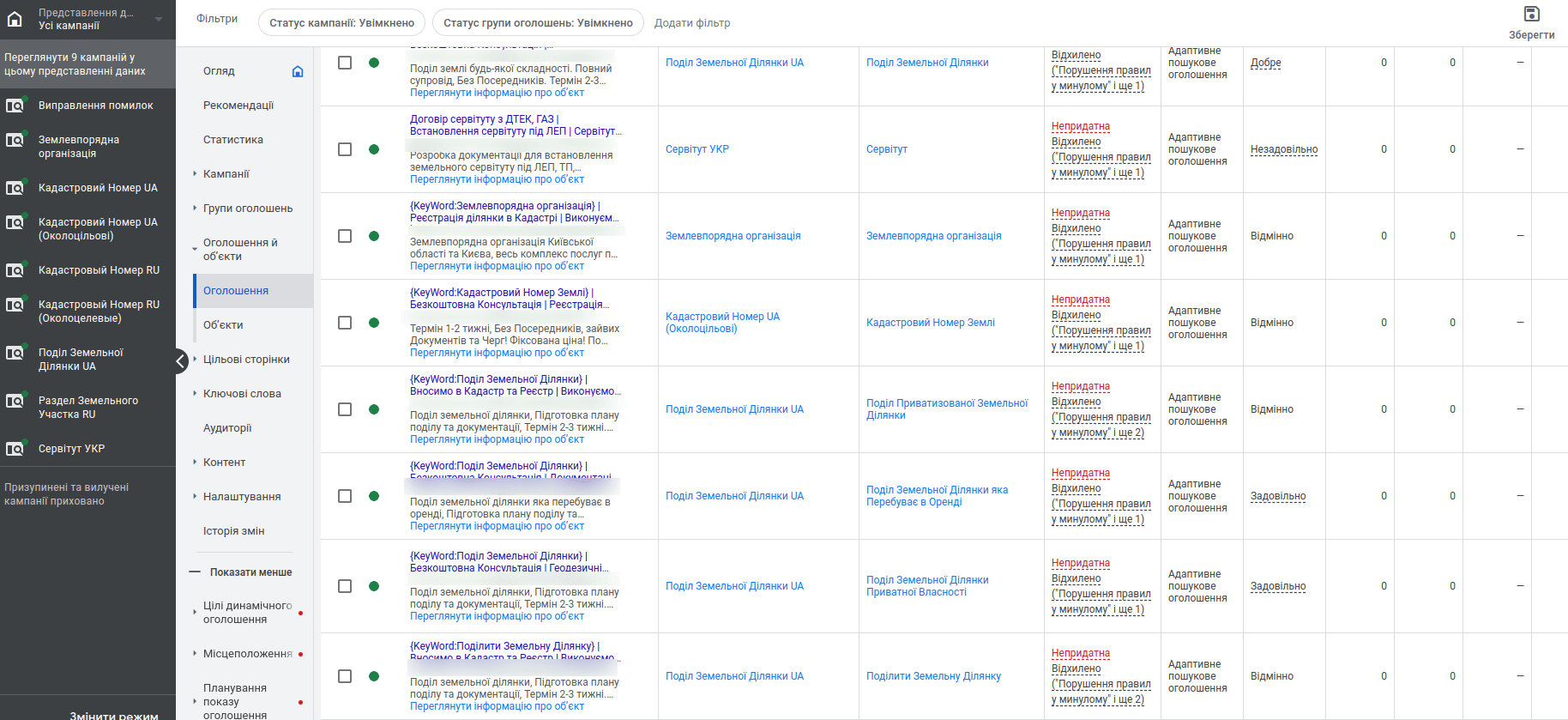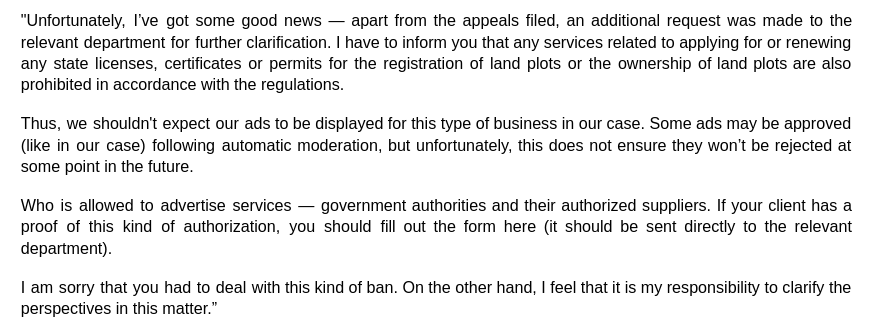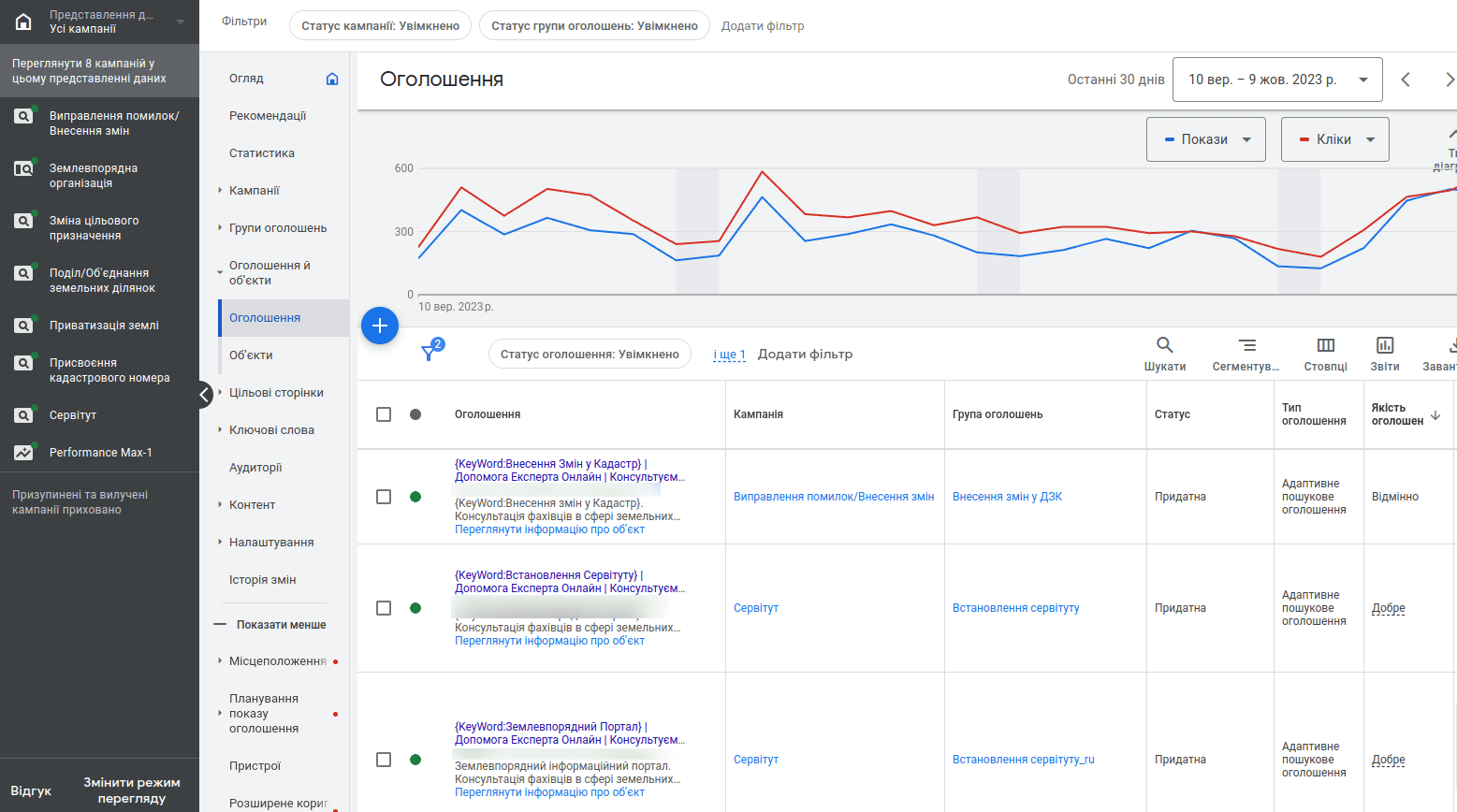Client
A land surveying organization with a team of qualified land professionals.
Services provided by the client:
- privatization of land plots;
- partition of land;
- making changes to the State cadastral register;
- formalizing easement rights and others.
Period of work: January 2023 – October 2023.
Our objective
The client contacted Aweb team with a request to solve the issue of multiple rejections of ads in Google Ads account due to the following reason: “Documents and services of state authorities in search advertising campaigns”.
Due to dynamic system updates, as well as the changes in advertising policies and regulations by the Google Ads platform, listings in ad campaigns that had been seamlessly operating since 2018, fell into rejection list.
Problem started: July 2022
Restoring stable operation of advertising campaigns
Determining the causes of deviations and working out the strategy
Virtually all contextual advertising specialists have encountered a “surprise” from Google Ads namely ad rejections. This is due to the regular automatic moderation of the advertising campaign components. And, seemingly, why something that was working steadily would now have the grounds for rejection.
The most common causes for unexpected deviations are as follows:
- Updates on the site “Rolling out” changes, editing code or content on the site can be the reason for rejection. These ads are most commonly rejected due to the following reasons: “Target URL does not work”, “Mismatched landing page”, “Infected site”, “Content bait”, “Unacceptable content”.
- Incorrect rejection by the system for any reason.
- Google Ads Rules Update
In order to effectively and timely address the cause of deviation, it is essential to analyze the changes made before the issues arose. Having analyzed the history of the client’s attempts to restore impressions, changes in the account and updates to the Google Ads Rules, our team came up with the conclusion that this was due to the changes in the ad placement policy.
Google has identified the client’s activities as falling under restricted activities:official documents and public services.
Algorithm for dealing with deviation in client’s case:
- Determining what is subject to rejection in Google Ads rules.
- Communication with Google Ads tech support, details and description of the problem, readiness to provide necessary documents (you should collect documents: receipts for the domain, registration of a legal entity, invoices, etc.).
- Making changes to the ad campaigns, account and site content.
- Working out plan “B” if deviation is imminent (unfortunately, this happens).
Based on the results of these items:
- the object of deviation is services rendered by the public authorities (not accompanying, consulting, assistance, etc.);
- unfortunately, changing content and creating new ad campaigns, neutral ads that bypass the topic of these services failed to solve the issue of large-scale rejection;
- tech support insisted there was no reason to continue, “for this type of business, you shouldn’t really expect ads to be shown.
Taking into account the information received from the Google Ads core-business department, our team moved to plan “B” and offered the client an alternative solution – create a landing page containing information about services, fully compliant with the platform’s requirements.Since the client’s website has a good ranking in the organic output, editing the well-optimized content would mean losing performance and sacrificing years of work to achieve success in this area.
Being aware of the client’s commitment to search ad campaigns, and also to avoid wasting time until the site is ready, we prepared alternative solutions, and upon the approval we launched the Performance Max ad campaign. From our experience, this type of RC is less subject to deviations due to cross-channel display (not only in search, but also in the contextual media network, YouTube). Obviously, the impressions may be limited, yet their presence at least partially covers the client’s needs.
Recommendations for landing pages and launching ad campaigns
Guided by the information related to the deviation object, and based on the chat with tech support and our experience, Aweb’s team prepared recommendations for lending which provided:
- content requirements. The rules have been drawn up in such a way as to prevent advertising of (conditional) intermediary activities. That is, if a person can do something on their own, and the company offers support, it is rejected. This is the main reason why we paid special attention to the description of services and the absence of the following trigger words in our recommendations: “Checkout”, “Order”, “Receive”, “Update”. We emphasized exclusively on consulting activities.
- no connection between the main site and new site. To avoid the same situation with rejections and the “restricted activity” badge from Google, you should use other contact information and avoid posting links to the main site.
The approach to creating ads had to immediately cover:
- the purpose of business – attracting target audience and potential clients;
- compliance with Google Ads policy – no reference to the mediation services;
- compliance with the internal standards, contributing to the effective performance of ad campaign.
Following the basic setup, we launched the ad campaigns. Later on, once we received a certain level of trust from Google Ads, we implemented the changes contributing to the improvement of audience quality and engagement indicators in the course of optimization.
What you should be prepared for if you determine that your services or products fall under the restrictions of Google Ads rules:
- embrace the uncertainty: There is no guarantee of the launch or effectiveness of ad campaigns, however, a professional team will always find a solution (if someone will promise you a 100% guarantee – never trust them);
- be patient: you shouldn’t expect to see the results tomorrow, since the processes also depend on the speed of Google’s response (and quite often in unpredictable terms, such as: “starting from 5 days”);
- stay flexible in your decisions: if one of the steps didn’t work out, you should be open to testing other solutions and tools.
Results of the work
Following the ads’ eligibility for display, absence of deviations and a period of sustainable performance, the client changed the goal of the ad campaign to the one that meets business objectives: conversions – targeted requests.
Taking into account the client’s adherence to all recommendations, our team can now scale the project by launching new areas and utilizing the algorithms of the Google Ads system to achieve business goals.
Project Participants:
PPC-specialist: Valeria Bigun
Project Manager: Marharyta Petrenko
Head of the Context Department: Halyna Lyman




